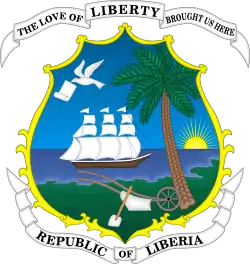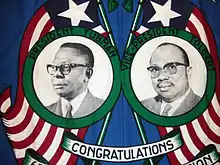1951 Liberian general election
General elections were held in Liberia on 1 May 1951, the first to be held under universal suffrage, as previously only male descendants of Americo-Liberians had been allowed to vote. This was the first elections in Liberia where women and the local Liberians owning property were allowed to vote based on a Constitutional Referendum in 1945–46. In the presidential election, William Tubman of the True Whig Party was the only candidate, and was re-elected unopposed.[1]
 |
|---|
| This article is part of a series on the politics and government of Liberia |
|
|
The previous elections used to be held in the month of May, ballots were counted during the Legislative meeting during November - December and the winning President and representatives take oath during the following January. The ballot papers used to be burnt during the interim. A new law was implemented which scrapped the practice and allowed to retain the papers until all the challenging parties of the results were satisfied.
Tubman was elected unopposed for a third term in succession and took oath in January 1952. William Richard Tolbert Jr., who was his running mate in the elections became the Vice-President for the first time.
History
In the United States, there was a movement to resettle free-born blacks and freed slaves who faced legislated limits, in Africa and predominantly in Liberia, believing blacks would face better chances for freedom in Africa than in the U.S.[2] The American Colonization Society was founded in 1816 in Washington, DC for this purpose, by a group of prominent politicians and slaveholders.[3] During the mid 19th century, there were continuous clashes between Liberian government and British merchants from Sierra Leone. The merchants were of the argument that the country had no rights to impose taxes. The elites in the colony wanted to declare sovereignty to overcome the issue, resulting in the declaration. During the 1846 referendum, there was a voting on declaration of independence to the nation. On 26 July 1847, the nation declared itself independent based on the popular voting and thus became the first democratic country in Africa.[4]
Background

The Legislature of Liberia was modeled based on the Legislature of United States. It is bicameral in nature with a Senate and the House of Representatives. There are 15 counties in the country and based on the population, each county is defined to have at least two members, while the total number of members to the house including the Speaker being 64. Each member represents an electoral district and elected to a four-year term (six years after 2011 elections) based on popular vote.[5] There were 18 senators, two each for the nine counties and they serve a six-year term (30 senators, 15 counties and nine years from 2011). Senators are also elected based on plurality of votes. The Vice-President is the head of the Senate and he also acts as President in his absence.[5] This was the first election in Liberia where women and the local Liberians owning property were allowed to vote based on a Constitutional Referendum in 1945–46. Previously, only men of indigenous descendants were allowed to vote.[6]
The previous elections used to be held in the month of May, ballots were counted during the Legislative meeting during November - December and the winning President and representatives take oath during the following January. The ballot papers used to be burnt during the interim. A new law was implemented which scrapped the practice and allowed to retain the papers until all the challenging parties of the results were satisfied.[7]
Elections

True Whig Party, founded in 1869, was one of the oldest political parties in the world and the oldest in Africa. The party was in power from 1877. The Party had a majority of Americo-Liberians, who descended from the United States and formed less than one per cent of the total population of Liberia as per the census of 1962. President William Tubman ruled from 1947 until his death in 1971 and William Tolbert continued after it.[8]
Twe emerged as an opposition to challenge the Presidency of Tubman and postulated that it was the responsibility of the United States of America to conduct free and fair elections in Liberia. He was disqualified on charges of sedition subsequently. Tubman canvassed with a theme of anti-communism and announced in an election rally that "it might be well that they endeavor to work out their own salvation and with fear and trembling". The Speaker of the House also drew examples from the US on the need to suppress Communism.[9]
The elections were held on 1 May 1951,[10] and Tubman was elected unopposed for a third term in succession and took oath in January 1952. William Richard Tolbert Jr., who was his running mate in the elections became the Vice-President for the first time.[11]
References
- "Elections in Liberia". African Elections Database. Retrieved 3 November 2016.
- "Background on conflict in Liberia". Friends Committee on National Legislation. July 30, 2003. Archived from the original on 14 February 2007. Retrieved 29 October 2016.
- Sale, Maggie Montesinos (1997). The Slumbering Volcano: American Slave Ship Revolts and the Production of Rebellious Masculinity. Duke University Press. p. 264. ISBN 0-8223-1992-6.
- Rodriguez, Junius P. (2015). Encyclopedia of Emancipation and Abolition in the Transatlantic World. Routledge. p. 1128. ISBN 9781317471790.
- "About The Republic Of Liberia – Politics". Ministry of Information, Government of Liberia. 2014. Retrieved 23 October 2016.
- Levy, Patricia; Spilling, Michael (2008). Liberia. Marshall Cavendish. p. 138. ISBN 9780761434146.
- "Liberian Politics". The Crisis. Marshall Cavendish: 181. March 1951. ISBN 9780761434146. Retrieved 5 November 2016.
- Okolo, Julius Emeka (1981). "Liberia: The Military Coup and Its Aftermath". The World Today. Royal Institute of International Affairs. 4 (4): 149. JSTOR 40395282.
- Burrowes, Carl Patrick (2004). Power and Press Freedom in Liberia, 1830-1970: The Impact of Globalization and Civil Society on Media-government Relations. Africa World Press. p. 242. ISBN 9781592212941.
- "Liberia (1943-present)". University of Central Arkansas. Retrieved 5 November 2016.
- Lea, David; Rowe, Annamarie (2001). A Political Chronology of Africa. ISBN 9781857431162.